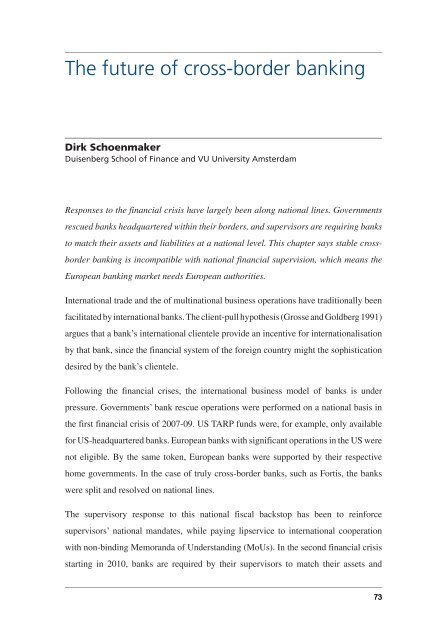You also want an ePaper? Increase the reach of your titles
YUMPU automatically turns print PDFs into web optimized ePapers that Google loves.
The future of cross-border banking<br />
Dirk Schoenmaker<br />
Duisenberg School of Finance and VU University Amsterdam<br />
Responses to the financial crisis have largely been along national lines. Governments<br />
rescued banks headquartered within their borders, and supervisors are requiring banks<br />
to match their assets and liabilities at a national level. This chapter says stable crossborder<br />
banking is incompatible with national financial supervision, which means the<br />
European banking market needs European authorities.<br />
International trade and the of multinational business operations have traditionally been<br />
facilitated <strong>by</strong> international banks. The client-pull hypothesis (Grosse and Goldberg 1991)<br />
argues that a bank’s international clientele provide an incentive for internationalisation<br />
<strong>by</strong> that bank, since the financial system of the foreign country might the sophistication<br />
desired <strong>by</strong> the bank’s clientele.<br />
Following the financial crises, the international business model of banks is under<br />
pressure. Governments’ bank rescue operations were performed on a national basis in<br />
the first financial crisis of 2007-09. US TARP funds were, for example, only available<br />
for US-headquartered banks. European banks with significant operations in the US were<br />
not eligible. By the same token, European banks were supported <strong>by</strong> their respective<br />
home governments. In the case of truly cross-border banks, such as Fortis, the banks<br />
were split and resolved on national lines.<br />
The supervisory response to this national fiscal backstop has been to reinforce<br />
supervisors’ national mandates, while paying lipservice to international cooperation<br />
with non-binding Memoranda of Understanding (MoUs). In the second financial crisis<br />
starting in 2010, banks are required <strong>by</strong> their supervisors to match their assets and<br />
73














